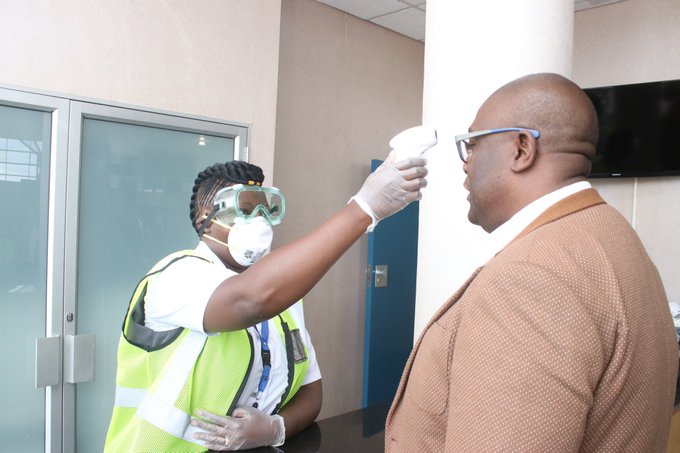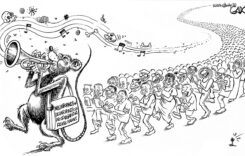The Zimbabwe government’s response to the threat of the coronavirus outbreak has drawn criticism on social media. How does it differ to positions taken by other African countries?
On February 9, the Ministry of Health and Child Care tweeted on the state of preparedness at Zimbabwe’s ports of entry. Replies to the post criticised the Zimbabwean authorities for not being clear on travel advice.
On January 27, 2020, the Ministry of Health and the Chinese Embassy in Harare issued a joint statement urging Zimbabweans and Chinese nationals to delay or cancel travel between the two countries.
This was reported on January 28, by the official Herald newspaper, in an article titled “Coronavirus: Zim, China urge delays in travel”.
On February 3, the Chinese ambassador to Zimbabwe, Guo Shaochun, held a press conference at which he urged Chinese nationals not to travel to Zimbabwe.
“Those who have returned to the most affected regions in China, such as Hubei Province, are advised to hold off coming back to Zimbabwe to reduce the risk of bringing the virus to Zimbabwe.”
Guo also said those that had traveled to China should isolate themselves for 14 days, the incubation period for the virus.
On Friday, February 7, Health Minister Obadiah Moyo, during a tour of health facilities in Bulawayo, said Zimbabweans should cancel travel to China.
“We are saying let’s not travel unnecessarily to those countries where the coronavirus is. Let’s not go to China right now. Let’s wait, postpone your trips to any other countries, which are affected. Let’s stay home and stay put,” Moyo was quoted as saying.
Have any African countries banned travel?
Have “other African countries” banned travel between their countries and China as suggested by some social media users in Zimbabwe?
Countries such as the USA and Australia now refuse entry to foreign nationals that recently traveled to China. Saudi Arabia has warned that “regulatory provisions on travel documents would be applied” to its citizens who travel to China.
Most African countries have, instead, gone only as far as to urge their citizens not to travel to China – which is what Zimbabwe has also done – and have not imposed bans on travel.
For example, South Africa’s Department of Health, in a February 5 statement, said it would not restrict travel, but that it discouraged non-essential travel.
“There is still no recommendation to restrict travel or trade with China. We have not put any restriction on travel or trade between China and South Africa although we do continue to advise that non-essential travel should be delayed until the situation abates,” the Department said.
This is the similar stance taken by countries such as Uganda, used as an example on Zimbabwean social media as a country that has given clear travel advisory.
The Seychelles has had a stronger response. On February 7, the country issued a notice advising citizens not to travel to China and that tour operators should give Chinese tourists “who were planning to visit the Seychelles in the coming months, the opportunity to cancel or postpone their holiday at no cost”.
Seychelles also advised airlines not to board any foreign nationals who have been to China in the preceding 14 days.
Some African airlines have halted direct flights to China. These include EgyptAir, Kenya Airways and RwandAir. The continent’s biggest airline, Ethiopian Airlines, has continued flights, although it has cut frequency.
Zimbabwe has no direct flights with China.
The World Health Organisation has urged against any travel restrictions.
“We reiterate our call to all countries not to impose restrictions that unnecessarily interfere with international travel and trade. Such restrictions can have the effect of increasing fear and stigma, with little public health benefit,” WHO Director General Tedros Adhanom Ghebreyesus said at a briefing to the UN’s executive board in Geneva on February 4.
Can Zimbabwe test for coronavirus?
On February 10, the Minister of Health announced that Zimbabwe had received the reagents and was now awaiting more rapid test kits.
At the start of February 2020, only two African countries, Senegal and South Africa, had the capacity to test for the virus, according to the WHO. This number had increased to six countries as at February 10, as Ghana, Madagascar, Nigeria and Sierra Leone received the reagents and test kits necessary to test for the virus.
“A new virus is always a challenge and most laboratories in Africa lack the key material they need to perform tests on a novel pathogen,” said Dr Matshidiso Moeti, WHO Regional Director for Africa in statement.
As at Feb 5, 71 samples had been received by South Africa’s National Institute of Communicable Diseases (NICD) from other African countries. All specimens tested negative for coronavirus.
Risk: How does Zimbabwe compare?
China is Africa’s biggest trading partner and around 10,000 Chinese firms are currently operating throughout the continent, according to Forbes magazine. Zimbabwe’s ties with China, which includes business and student travel, also places it at some risk.
The WHO has, however, identified 13 African countries that are at the most risk, based on direct links and the high volume of travel between those countries and China. Zimbabwe is not among these countries, which have higher volumes of traffic with China and stronger economic links.
The WHO’s 13 top priority in the African region are: Algeria, Angola, Cote d’Ivoire, the Democratic Republic of the Congo, Ethiopia, Ghana, Kenya, Mauritius, Nigeria, South Africa, Tanzania, Uganda and Zambia.
Do you want to use our content? Click Here












